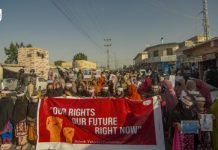On December 10, International Human Rights Day, protests, rallies, and seminars were held across various cities, including Turbat, Quetta, Hub, Karachi, and Islamabad. The events, organized by the Baloch Yakjehti Committee (BYC) and other groups under the theme “Our Rights, Our Future, Right Now,” aimed to highlight ongoing human rights violations in Balochistan.
Participants, including human rights activists, lawyers, and political figures, called for action to address enforced disappearances and other rights abuses. However, many events faced significant restrictions imposed by state authorities, sparking criticism from organizers and attendees.
Blocked Access in Hub Chowki
In Hub Chowki, participants planned a peaceful walk outside the Lasbela Press Club to raise awareness of human rights abuses. However, authorities reportedly blocked the entrance to the venue by placing garbage trucks and barriers.
At the site, the mother of Rashid Hussain Baloch, a forcibly disappeared activist, stood holding a picture of her son. “We came for a peaceful protest, but the authorities blocked our way with garbage trucks,” she said.
The BYC condemned the move, calling it an unlawful restriction on peaceful assembly. In a statement, the group said, “The administration has blocked the premises of Lasbela Press Club using garbage trucks, preventing peaceful citizens from organizing an awareness walk to highlight human rights abuses in Balochistan.”
Despite the obstacles, women, children, and other participants protested outside the press club, demanding the recovery of their missing loved ones. They described the restrictions as anti-democratic and a violation of their constitutional rights.
Profiling at Events in Quetta and Turbat
In Quetta, a BYC-organized seminar faced disruptions when authorities reportedly required attendees to provide their names, parentage, and national identity card details before being allowed entry.
Organizers alleged that this was an attempt to profile Baloch political and human rights activists for later harassment. “The administration and police are using these measures to intimidate participants,” the BYC said in a statement on X.
Similar issues were reported in Turbat, where police and local officials allegedly conducted profiling of both male and female attendees at a seminar commemorating Human Rights Day.
“The Kech administration and police are creating hurdles in the seminar and profiling participants,” the BYC said in a statement, adding that such actions were intended to “suppress the voices of peaceful activists.”
BYC Condemns Restrictions
The Baloch Yakjehti Committee (BYC) condemned the state’s actions as “blatant violations of freedom of expression, assembly, and civil rights.” They accused the authorities of deliberately sabotaging their events despite organizers obtaining the necessary permissions.
“State authorities are violating the fundamental rights of Baloch even on Human Rights Day,” the BYC said. They added that this was occurring “despite BYC having NOCs and fulfilling all standard procedures to organize awareness seminars.”
The BYC described the actions as “absolutely illegal” and a violation of the rights to freedom of expression, assembly, dignity, and civil and political rights. They alleged that the state, despite being a signatory to the Universal Declaration of Human Rights (UDHR) of 1948, had “dehumanized the Baloch and made Balochistan a human rights-free zone.”

